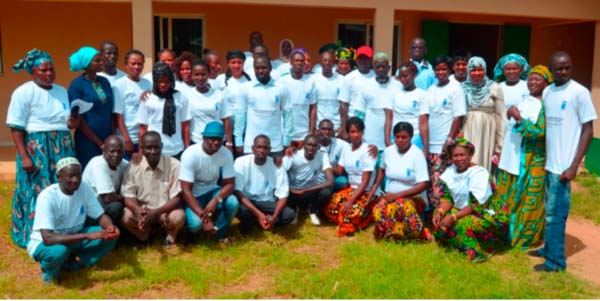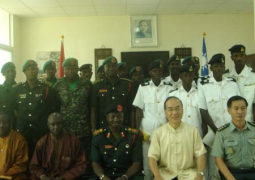
Young
people of The Gambia have been urged to exercise their civic right by fully
participating in politics.
Speaking
at Bwiam during the opening ceremony of a daylong seminar on women and youths
participation in politics, Kaddy Sanneh, West Coast Region youth committee vice
chairperson, said it has been observed that there is limited youth
participation in politics, which should not be the case.
The
seminar was organised by the National Council for Civic Education (NCCE) and
funded by UNDP under the Election Project for The Gambia, 2016-2018, electoral
cycle.
The
daylong seminar brought together representatives from political parties, youth
organisations, institutions, NGOs among other stakeholders within the West
Coast Region.
The
daylong seminar is part of nationwide activities being conducted by the NCCE in
all regions of the country.
The
sensitisation activity is aimed at enhancing knowledge on the importance of
women and youths participation in politics and elections, and representation in
decision-making institutions.
At least 300 women and youths are expected to
be sensitised nationwide.
Ms
Sanneh, who was deputising for the Executive Director of the National Youth
Council, said young people see their involvement in politics as meaningless,
useless, valueless and time wasting, which they should avoid.
Young
people and groups should be aware that participation and representation in
politics is their right which they need to exercise, she added, noting that it
is their right towards self and national development.
Ms
Sanneh stated that: “As young people, we are not voiceless, yet our voices are
not heard because we do not take part in politics. We are not the minority, but
yet are not seen because we isolate ourselves. We are not the powerless, but
yet our powers are misplaced”.
She,
therefore, called on youths to be involved and participate in politics to
address issues affecting them.
As
youths they do not have to see politics as something meant for elders, she told
youths, adding that they are the future and participating in politics means
preparing their future.
She
called on the youths to take the lead in politics.
“We
always sit back complaining and blaming leaders that what they are doing is not
right,” she said, adding: “If we do not want the things they are doing for us,
let us go ahead and take the lead and express our views for people to know our
concerns, and be able to come out with solutions.”
She
described voting as very important, saying election is just at the corner and,
therefore, called on the youths to get a voter’s card and vote come the
election.
Having
voter’s cards and not voting is not the solution, she went on, while urging
youths to change their attitude towards politics.
“This
is our country and nobody will develop it for us; by voting is one way of
developing it ourselves, she said.
Bintou
Fatty-Joof, a representative of the Executive Director of the Women’s Bureau at
Bwiam, in her statement, said the importance of women’s participation in
politics could not be over emphasised because as the saying goes, “if you
empower a woman you empower a nation”.
She
said when a woman holds a key political position it enhances sustainable
development, which helps in breaking the gender inequality that exist between
men and women.
Mrs
Fatty-Joof further stated that it is time for women to stand firm and go into
politics as political candidates, rather than being just mere clappers and
dancers for men in political positions.
She
added that it is important for women to trust and have confidence in their
fellow women candidates, who opt for political positions in their respective
districts so as to enhance female participation in politics, rather than
undermining them.
“Promoting
women’s participation in politics is in line with our commitment to equal
rights and inherent dignity of women as enshrined in the UN Charter, the
Universal Declaration of Human Rights, the CEDAW protocols and even in our
national constitution.”
She
further noted that although they have to salute the affirmative action the
Government of The Gambia has been doing by nominating women into political positions,
it is time women start contesting political positions rather than just being
nominated in order to increase women’s participation in decision-making.
Women’s
participation is fundamental to democracy and essential to achieving
sustainable development goals and peace, she further stated, noting that data
has shown that countries with greater gender equality have higher gross
national product and per capita income.
Women’s
leadership in corporate sectors of the economy results in improved performance,
equitable laws and social programmes and budgets that benefit women, children
and families, she said.
This
was why they work to ensure policies are in place to enhance gender equity and,
as such, sensitization activities of such are needed to create awareness and
enhance female participation.
Equality
and women’s participation in politics and decision-making is a human right and
not a privilege, she asserted.
Saikou
Darboe, Lower River Region regional youth committee chairperson, speaking at a
similar seminar organised by NCCE in the region on 28 August 2016, said The
Gambian constitution has given every citizen the right to vote for and be voted
for, provided they meet the age requirement.
“Youth
participating in politics would result to government putting us at the heart of
the priority,” he said, adding that youths are less represented in key
positions, which is why youth issues are never taken seriously.
“We
have gathered on several occasions as youths and made resolutions, but they
always stop at where we prepared them,” he said, noting that this is because of
lack of representation in key positions.
Mr
Darboe urged political parties to give way to young people, adding: “give
responsible positions to young people - we need seats in political parties and
not running after, dancing and supporting political parties”.
Youth
participation in politics would make government youth-friendly, as well as
bring about sustainable development, because they form the majority and their
participation is very key, he added.
“It
is time youths act now,” he declared
“We
always sit in our corners with our anger, he went on, noting that the only way
to stop that is by participating in politics and taking their rightful
positions.
According
to him, by participating in politics they could dictate political parties in
the country.
Mustapha
Colley, a representative of the Executive Director of the Women’s Bureau at
Pakalanding, said politics does not stop at only being voted for or voting for
someone, but also participating and taking part in decision-making.
“Politics
is beyond singing, clapping, dancing and cooking and as such women should
contest for positions as it is their right,” he said, while urging them to go
beyond being content with only being nominated for positions, to show that they
have the knowledge and ability.
Government
could also come up with policies of equal or fair representation of men and
women in key positions, he added.
He
said political parties could also come up with this in their executives to
address the issue of gender inequality.
Isatou
Bittaye, senior programme officer at NCCE, said through their interactions with
the citizenry, it was evident that most young people have little or no interest
in politics and governance; hence their low participation in elections and high
voter apathy among them.
She
added that although women are actively participating in politics, their
participation does not translate to their equal representation in political
offices as men.
She
pointed out that for democracy and good governance to be attained, there must
be inclusiveness and participation by the citizenry.
“The
Gambia has ratified several international conventions that promote women’s
political participation, and the 1997 Constitution has guaranteed the right to
political participation to everyone; yet women and youth representation in
decision-making bodies continues to be challenged.”
For
sustainable economic and social development to take place, full and equal
participation of women, men, boys and girls are required, she said.


